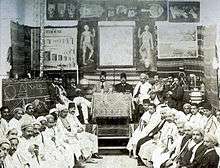Khaldounia
Madrasa Al Khaldounia or simply Khaldounia (Arabic: الخلدونية) is the first modern school founded in Tunisia on December 22nd, 1896.
The madrasa is a good example of democracy, as all its members and presidents were elected. It was a free, public and laic institution. For years, it published regularly a review to facilitate Franco-Tunisian exchanges.
Nowadays, it is a bilingual library attached to the National Library of Tunisia.
History

Khaldounia was established by Young Tunisians led by Bechir Sfar, who aimed to spread the scientific knowledge in the arabic culture. He had the support of René Millet,[1] the French resident-general in Tunisia who was in charge of writing the madrasa's status that excluded political and religious discussions and emphasized on the importance of critical thinking.
References
- This article incorporates information from the equivalent article on the French Wikipedia.
- ↑ Noureddine Sraïeb (1994). "Le collège Sadiki de Tunis et les nouvelles élites". Revue du monde musulman et de la Méditerranée (in French). 72 (72): 47. Retrieved 21 February 2016.